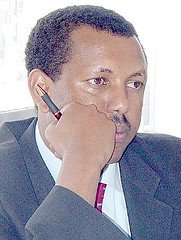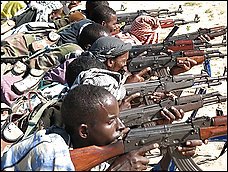
According to addisfortune magazine, both American and European diplomats have submitted a joint, highly confidential report on their observations of the opposition trial to the government Of Meles Zenawi last week. The 10-page report was a damning document to the government, claims addisfortune's Gossip Column.
At least four observers affiliated to the US. State Department and the European Commission were deployed to follow the impartiality and integrity of the trial from December 2005 to June 2006. They have now a conclusion that Donald Yamamoto says is troubling and concerns his country a great deal.
The report submitted to the government, according to addisfortune in the diplomatic circles, is harsh on the public prosecution claming that there was “ serious misconduct” on the part of the prosecution such as being unprepared and late for an average of 45 minutes to an hour, as well as a persistent refusal to produce copies of evidence. It also produced, frequently, new evidence that was not produced during presentation.
Although modest, the report did not spare the conduct of the court from criticism either. According to addisfortune's Gossip Column, this report claims that the court had failed to observe “what would be the most basic evidentiary procedures for trial”.(More...)
Prominent Hastert constituent questions blockage of H.R. 5680
Today, October 2, 2006, prominent Hastert constituent, Ms. Chana Bernstein, Executive Director, Community Focus, slammed Hastert for blockage of a human rights bill in a letter to the editor of Daily Herald published in the Chicago area. Hastert's constituent wrote:
Hastert blocking human rights bill
 I am completely mystified by the conduct of our representative and House Speaker, Dennis Hastert, who has chosen to block an important Ethiopian human rights bill pending in Congress from a long awaited vote.
I am completely mystified by the conduct of our representative and House Speaker, Dennis Hastert, who has chosen to block an important Ethiopian human rights bill pending in Congress from a long awaited vote.The Ethiopia Freedom, Democracy and Human Rights Act is supported widely in Congress and follows the spirit of the president's address to the nation: All who live in tyranny and hopelessness can know the United States will not ignore your oppression, or excuse your oppressors. When you stand for your liberty, we will stand with you."
The bill passed unanimously in the House International Relations Committee this past June, but Speaker Hastert has blocked it from going to the House floor for a final vote. Why? That is the question Ethiopian-Americans are asking. A cursory reading of the bill shows that the Ethiopian human rights bill is a reasonable one. It encourages Ethiopia to have free speech and press, honest elections, fair judges and a just judicial system and demands release of hundreds of innocent political prisoners.
The bill also provides support to Ethiopia to become an effective partner in the global war on terror.
What is curious about Mr. Hastert's actions in blocking the Ethiopian human rights bill is the explanation given by his district office that the White House needs to do additional fact-finding on the bill and that Hastert is waiting to hear from the president on what should be done on the legislation.
The International Relations Committee did all of the fact-finding, including getting input from the State Department, before passing it unanimously.
What additional fact-finding does Mr. Hastert or the president need? Could there possibly be a connection between the bill and former House Majority Leader Richard Armey, a lobbyist for the Ethiopian government, that has the Speaker's ear?
But the real issue is why Hastert does not actively support human rights in a country that has experienced so much political turmoil, oppression and instability over the past decades. Why is Hastert (or is it the White House?) keeping the Ethiopian human rights bill from getting a floor vote?
Maybe he can answer it if he is listening!
Chana Bernstein
Executive Director
Community Focus
Wheaton
Lidetu Ayalew denounces Dr Berhanu’s Book
 (ETP - H.A) In a rambling, excruciatingly long letter posted on the EDEPA- MEdhin party website, Lidetu Ayalew tries to ridicule and discredit Dr. Berhanu’s book “Yenetsanet goh Siked”. Ato Lidetu's interviews while visiting the U.S demonstrated his uncanny ability to talk for hours with out saying anything of substance. Now we are learning that his writing is pretty much similar to his speeches. The website has already posted about twenty pages of lidetu’s letter and they assure readers that more is on the way. In traditional Amharic there is a special name reserved for individuals such as Mr. Lidetu , “ifrete Biss”. Lidetu's letter Part 1 and Part 2
(ETP - H.A) In a rambling, excruciatingly long letter posted on the EDEPA- MEdhin party website, Lidetu Ayalew tries to ridicule and discredit Dr. Berhanu’s book “Yenetsanet goh Siked”. Ato Lidetu's interviews while visiting the U.S demonstrated his uncanny ability to talk for hours with out saying anything of substance. Now we are learning that his writing is pretty much similar to his speeches. The website has already posted about twenty pages of lidetu’s letter and they assure readers that more is on the way. In traditional Amharic there is a special name reserved for individuals such as Mr. Lidetu , “ifrete Biss”. Lidetu's letter Part 1 and Part 2Kenya Having Second Thoughts On Supporting Ethiopia on Somalia
Initially, Kenya, through Foreign Affairs Minister Raphael Tuju, was categorical that the only solution to the Somali problem was to send in Igad peacekeepers, even without the consent of the Union of Islamic Courts.(Picture - Kenya's President Mwai Kibaki)
 This position, in the eyes of the Islamic Courts, portrayed Kenya as having closed ranks with Ethiopia, which has been campaigning for the deployment of Igad troops. This threatened to rob Kenya of its image as an honest and trusted broker of the Somali peace process.
This position, in the eyes of the Islamic Courts, portrayed Kenya as having closed ranks with Ethiopia, which has been campaigning for the deployment of Igad troops. This threatened to rob Kenya of its image as an honest and trusted broker of the Somali peace process.Of late, Kenya seems to be backtracking on the issue of the deployment of Igad troops, even as it maintains its support for TFG as the internationally recognised authority.(More...)
Home Affairs goes to Mogadishu
Indian Ocean Newsletter N° 1196 30/09/2006
According to information obtained by The Indian Ocean Newsletter from a diplomatic source, some officers from the Eritrean ministry of defence and officials from the Eritrean intelligence services were preparing to go to Mogadishu (Somalia) this week.
 These Eritrean servicemen will probably not be content with merely studying the local situation, but will most likely provide support to the forces of the Union of Islamic Courts (UIC) to help them counter a possible sizeable Ethiopian military intervention in Somalia.
These Eritrean servicemen will probably not be content with merely studying the local situation, but will most likely provide support to the forces of the Union of Islamic Courts (UIC) to help them counter a possible sizeable Ethiopian military intervention in Somalia.According to the same source, embittered Eritrean soldiers and Ethiopian opponents trained in guerrilla fighting by the Ogaden National Liberation Front (ONLF) will probably also be transported to Mogadishu by the Asmara regime. Some combatants from the Oromo Liberation Front (OLF, Ethiopian opposition) may do likewise. Certain Eritrean servicemen en route for Mogadishu this week may transit via Djibouti.
Today's Top Stories
-Somali Government officers obtain weapons and ammunitions from Ethiopia-From prison to prizes - Nobel laureate writes autobiography
-Hastert dismisses call for resignation
-Foley says he was abused by a clergyman
-North Korea says it will stage nuke test
-Turkish plane seized in hijacking
-Russia Suspends all Georgia Transport Links
-Americans win Nobel for Big Bang study
-Judge orders Bobby Brown arrested in Massachusetts








